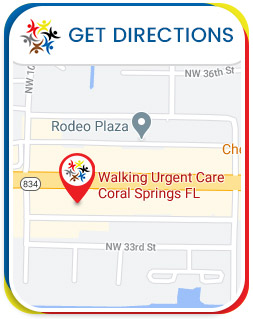Can You Go to Urgent Care For an Ultrasound?
An ultrasound may be recommended for a variety of diagnostic or medical purposes. Let us assist you in maintaining your health. Dr. Naseh Nawabi offers rapid, painless, and convenient ultrasound procedures to diagnosis numerous medical disorders, monitor pregnancies, and detect injuries at Walking Urgent Care. We do not require appointments and are always accessible to provide care when you require it. For more information, Contact us or walk in, we are conveniently located at 10308 W Sample Road Coral Springs, FL 33065.


Table of Contents:
What is the purpose of an ultrasound?
What procedures are done with ultrasound?
How do I prepare for an ultrasound?
How long does the first ultrasound take?
Ultrasound scans are medical tests that use high-frequency sound waves to create live images of the inside of the body. Ultrasounds are used to identify problems with organs, vessels, and tissues without the need for an incision.
Due to a lack of radiation involved in an ultrasound, it is the most common method for viewing a growing fetus during pregnancy. Ultrasound scans are commonly associated with pregnancy. An expectant mother can see her unborn child for the first time during these scans. There are, however, many other uses for the test.
If you have pain, swelling, or other symptoms requiring an internal view of your organs, your doctor may order an ultrasound.
Noninvasive procedures can be guided with ultrasound. Ultrasound can be used by radiologists to locate and examine fluid collections in tendons, muscles, cysts, and soft-tissue masses. There are a wide range of procedures performed with ultrasound, some of the most common include thoracentesis, paracentesis, ultrasound-guided biopsy, hysterosonography, and more.
To perform a thoracentesis, a local anesthetic is injected into the chest cavity and the thoracentesis needle is inserted above the rib cage. It is possible to withdraw and collect fluid and send it to a lab for analysis. Fluid is removed from the space between the lining of the outside of the lungs and the chest wall during this procedure.
A paracentesis is a surgical procedure in which fluid from the abdominal cavity is collected through the insertion of a needle through the abdominal wall. In ultrasound-guided biopsy, the mass is located via ultrasound and then a piece is removed for analysis using a core needle.
It is likely that you will be lying on your back or turned slightly during this procedure. The radiologist will use an ultrasound probe to inject a numbing agent at the site of the biopsy. Afterward, the probe will assist in guiding the needle into the mass, and sample will be collected. Women with infertility or multiple miscarriages can undergo hysterosonography to investigate uterine abnormalities.
Depending on the area or organ under examination, you will need to take specific preparation steps ahead of your ultrasound.
Fasting for eight to 12 hours before your ultrasound is recommended, especially if you are having your abdomen examined. Food that has not been digested can block sound waves, making it difficult for the technician to see clearly.
You may be told to fast until the procedure for tests on the gallbladder, liver, pancreas, and spleen the evening before the test. If you have been instructed to drink water and take medications, you can do so as usual. Other examinations may require you to drink lots of water and hold your urine to better visualize your bladder.
Prescription drugs, over-the-counter medications, and herbal supplements should be disclosed to your doctor before the exam.
Following your doctor’s instructions and asking questions before the procedure is very important.
There are minimal risks associated with ultrasounds. The use of ultrasounds does not involve any radiation, unlike the use of X-rays or CT scans. Therefore, during pregnancy, ultrasounds are preferred for examining developing fetuses.
How long an ultrasound will take will depend on the reason for the test among other factors. The first ultrasound during pregnancy is a painless process that usually takes around 30 minutes. To obtain ultrasound images, the technician will apply warm gel to your abdomen and use a scanning device. Occasionally, the ultrasound must be performed through the vagina; this procedure may be uncomfortable, but is not considered painful.
Ultrasounds are available at Walking Urgent Care Clinic in Coral Springs, FL. For more information, Contact us or walk in. We are conveniently located at 10308 W Sample Road Coral Springs, FL 33065. We serve patients from Coral Springs FL, Parkland FL, Coconut Creek FL, Boca Raton FL, Margate FL, North Lauderdale FL, and all of Florida.










